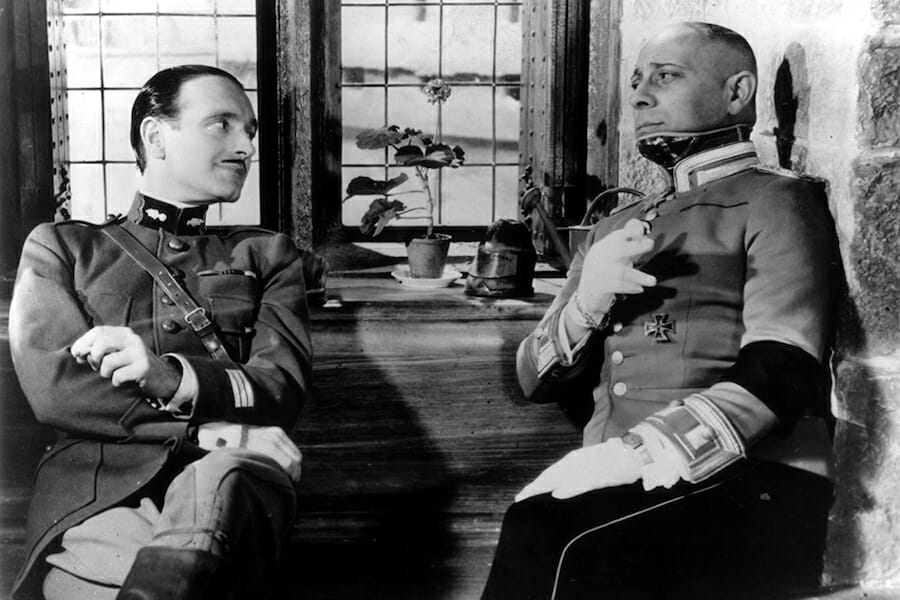
Review: Jean Renoir’s ‘Grand Illusion’
In the 21st century, war movies are intensely popular, even if it’s warfare on the industrial level. We’ve become accustomed to movies that follow a formula, regardless of whether they’re supposed to be realistic or have taken a page out of a comic book. The Rambo genre, for example, is marked by made for action figure hulks, gigantic figures whose testosterone is enhanced with steroids and whose martial arts skills are both manual and hi-tech. The one man army exhibiting the technological capacity for creating as much devastation as an entire platoon could have done in Vietnam.
The heroes’ violence and cruelty and their absolute commitment to eradication of the opposing nation, race, or species are directed straight to the fan base – given the fact that their fan base tends to be pre-teen and teenage boys, it’s a perfect circle of adolescent madness in adult bodies.
War movies from the earlier part of the 20th century are from a gentler or subtler time. In Grand Illusion (La grande illusion), directed by Jean Renoir, widely recognized as a masterpiece of French cinema, revolves around a person’s character- a striking moment- sounds and sights, which are unique and stunning. Images that linger long in the memory. There is a minimum of violence on screen- even the torture scenes, important to the story, are muted. It is implicit rather than explicit. Even the iconic character who embodies what later became a Nazi prototype – the aviator and aristocrat Kommandant von Rauffenstein, played by Erich von Stroheim, displays his own version of grace and elegance and even compassion, alternating with the barks of violent power.
The Kommandant wears a monocle. He informs his captives that he has silver plates in his back and head that render him stiff and nearly motionless from the waist up. His eyes bulge in a near comic but sinister fashion.
He seldom walks but marches stiffly here and there staring straight ahead with swagger stick and saber, his soldiers hurriedly parting to allow him maximum room to move. Von Rauffenstein, with a neck so encircled by a tight high collar that he can scarcely turn it, resembles many early pictures of Humpty Dumpty in my baby’s book of fairy-tales, but adult, and grown into his evil powers.
Von Rauffenstein is not a buffoon. He is not even a thoroughly detestable villain. He is a complex character. Rauffenstein is not only aristocratic but trilingual, with a distinct American flavor to his English and even to his German (Erich von Stroheim by this time had spent a great deal of time in Hollywood). Von Rauffenstein is openly anti-Semitic but wavers in his stated beliefs. Although we know he commits cruel acts, most occur off stage. Oddly he is also able to empathize, although most of his sympathies are focused on his opposite French number, who is the captured French PoW Captain de Boeldieu (played by Pierre Fresnay).
Boieldieu, a captured aviator and fellow aristocrat, if possible is even more elegant and mannered than Rauffenstein. He also sports a monocle. He too is trilingual- speaks English with what sounds to an ignorant American like vintage Oxbridge—and is, we are given to understand, the social and professional equal – possibly, the superior – of Rauffenstein.
And this matters, even in wartime. Invited to a luncheon with von Rauffenstein, Boieldieu learns that they have many friends in common, across language, and cultural borders, which would seem to make a mockery of the current national enmity. It is a significant luncheon in terms of establishing loyalties; although Rauffenstein later is compelled to shoot the escaping prisoner Boieldieu in the stomach, he also nurses Boieldieu until he dies, lamenting the passing of the old order.
Clearly the issue of class as expressed in dress, language, and deportment is no joke. Although of the same rank as Boieldieu, and invited to the same luncheon, captured aviator Lieutenant Maréchal (Jean Gabin) and Lieutenant Rosenthal (Marcel Dalio) are not invited into the inner circle, which Rauffenstein is eager to establish with Boileudieu.
Maréchal is working class; Rosenthal is Jewish. Both are thus beyond the pale, as defined by Rauffenstein, even though Rothschild later casually details the extent of his family’s real estate holdings and kindly shares with others the food packages he has received. Nevertheless, aristocrat and working class, they are all taken to a PoW camp.
From then on the movie’s energy resembles that of the Third Man- vivid black and white scenarios, set pieces such as the outrageous drag revue put on by the camp’s PoW French prisoners, and the inspired break in the middle of the revue, as the prisoners burst into a spirited rendition of La Marseillaise when they hear that the Germans have captured Fort Douaumont in the Battle of Verdune. And a note of pathos when the working class but powerfully charismatic Maréchal – so photogenic that a poster of him has been reproduced and is for sale to Film Forum customers- is put into solitary confinement at the same time that the prisoners are attempting to dig a tunnel to break out of the camp.
There is a poignant moment when we see Maréchal take a teacup and spoon and scratch desultorily at the walls. It highlights his isolation and depression. The effort seems hopeless but he and his fellows persevere. Their breakthrough is almost accomplished when they get notice that they are being transferred to another camp. Rather than detailing the plot further, let me just note that by this time I was both highly entertained and disoriented- this is a war movie! Where are the explosions? Where is the obsession with machinery? The closest they come is at the very beginning when our heroes are on a flight to track down a spot on an aerial photo—from which Von Rauffenstein shoots them down.
Where is the violence against the indigenous population? Well, we don’t really meet them. There is a bit of sexual suggestion and swagger with the PoW camp prisoners’ revue, but it is all in good fun. There are no victims—and there is one wonderful moment (noted by every reviewer) when one PoW in Marie Antoinette petticoats and a powdered wig takes off his wig to sing Le Marseillaise, and rendering himself male as opposed to female.
It is impossible to forget the moment in Casablanca when a gorgeous collaborator, who has been too conspicuously close to a German officer, bursts similarly with Rick’s bar crowd into the Marseillaise, and shouts, “Vive la France!” (Thereby perhaps laundering her reputation.) The scene is a touchstone. After a series of reassignments Maréchal and Rosenthal and the rest of the French PoWs organize a jailbreak. Their method is so simple it’s laughable but completely effective. They set up sites all around the camp for making ear splitting noise-the shrill shrieks of flutes breaks out in one corner, and mad banging on pots and pans in another- which so distracts the German personnel, compelled to run to the disruption in order to suppress it- that Maréchal and Rosenthal are able to make a run for it.
A German farmwoman takes in Maréchal and Rosenthal and hides them. She and Maréchal are beginning to fall in love, but the relationship between her and Maréchal is tender and very briefly touched upon. It is not clear whether they will manage to get together after the war. The last scenes are of two figures trudging through deep snow to Switzerland.
Orson Welles named Grand Illusion as one of the movies he would take with him “on the ark.” Hard to disagree.

